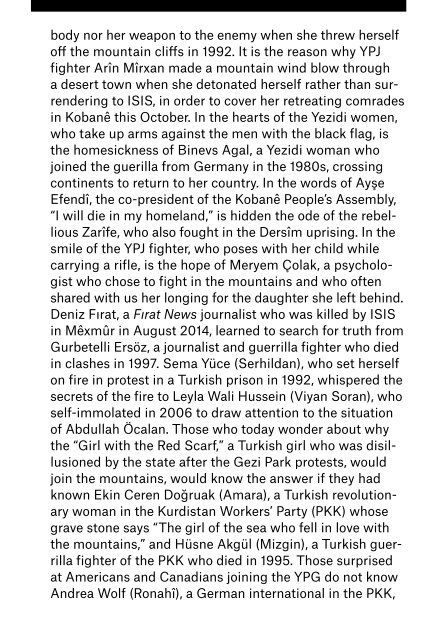Stateless Democracy
1RHiH4Y
1RHiH4Y
Create successful ePaper yourself
Turn your PDF publications into a flip-book with our unique Google optimized e-Paper software.
ody nor her weapon to the enemy when she threw herself<br />
off the mountain cliffs in 1992. It is the reason why YPJ<br />
fighter Arîn Mîrxan made a mountain wind blow through<br />
a desert town when she detonated herself rather than surrendering<br />
to ISIS, in order to cover her retreating comrades<br />
in Kobanê this October. In the hearts of the Yezidi women,<br />
who take up arms against the men with the black flag, is<br />
the homesickness of Binevs Agal, a Yezidi woman who<br />
joined the guerilla from Germany in the 1980s, crossing<br />
continents to return to her country. In the words of Ayşe<br />
Efendî, the co-president of the Kobanê People’s Assembly,<br />
“I will die in my homeland,” is hidden the ode of the rebellious<br />
Zarîfe, who also fought in the Dersîm uprising. In the<br />
smile of the YPJ fighter, who poses with her child while<br />
carrying a rifle, is the hope of Meryem Çolak, a psychologist<br />
who chose to fight in the mountains and who often<br />
shared with us her longing for the daughter she left behind.<br />
Deniz Fırat, a Fırat News journalist who was killed by ISIS<br />
in Mêxmûr in August 2014, learned to search for truth from<br />
Gurbetelli Ersöz, a journalist and guerrilla fighter who died<br />
in clashes in 1997. Sema Yüce (Serhildan), who set herself<br />
on fire in protest in a Turkish prison in 1992, whispered the<br />
secrets of the fire to Leyla Wali Hussein (Viyan Soran), who<br />
self-immolated in 2006 to draw attention to the situation<br />
of Abdullah Öcalan. Those who today wonder about why<br />
the “Girl with the Red Scarf,” a Turkish girl who was disillusioned<br />
by the state after the Gezi Park protests, would<br />
join the mountains, would know the answer if they had<br />
known Ekin Ceren Doğruak (Amara), a Turkish revolutionary<br />
woman in the Kurdistan Workers’ Party (PKK) whose<br />
grave stone says “The girl of the sea who fell in love with<br />
the mountains,” and Hüsne Akgül (Mizgin), a Turkish guerrilla<br />
fighter of the PKK who died in 1995. Those surprised<br />
at Americans and Canadians joining the YPG do not know<br />
Andrea Wolf (Ronahî), a German international in the PKK,<br />
who was murdered in 1998 and whose bones were thrown<br />
into a mass grave, and whose memorial could not be tolerated<br />
by the state.<br />
Our calendar did not run parallel to the world’s calendar.<br />
These women’s gazes were focused deep into the<br />
far distance, and their steps were fast. In order to bring<br />
the future closer, they impatiently left not a single bridge<br />
behind. These two reasons kept us apart from the realities<br />
of the world. That is why the world did not know the<br />
women in the mountains — the tens, then hundreds, and<br />
later thousands of them — in the same time frame. Now it’s<br />
time to combine calendars, to set clocks. It is time to tell<br />
these women’s life stories that swung between dream and<br />
reality, their happy moments that sound like fairy tales as<br />
well as the ways in which loss has proven to be our most<br />
egregious teacher in our quest for truth. Now is the perfect<br />
time to entrust what I was able to carry from the past to<br />
this day. In order to join the world’s calendar, I will carry our<br />
past to the present. May my past be your present.<br />
I wake up on a cold spring morning of Cirav in 1997. I<br />
throw the nylon, moist from the frost of the previous night,<br />
off of me and I see a face in front of me, different from<br />
those of the swarthy warriors. It is as if the sun had only<br />
mildly radiated on this face; as if her hands, her smile,<br />
described elegance and nobility. I am happy that a warrior<br />
who is newer than me has arrived, that I have become<br />
a little old. I later find out that I had a fifth-year guerrilla<br />
in front of me. At the time, I knew only her code name,<br />
Zinarîn. Had it not been for the white strings in her hair<br />
or the way sorrow sometimes carried her smile away, you<br />
would not have been able to understand that she had been<br />
a guerrilla for five years. I am unaware of the pains she has<br />
experienced, the sacrifices she has made in her quest for<br />
truth. I am going crazy, curious about what she is writing<br />
in her notebook as she takes refuge under the shadow of a<br />
76–77



